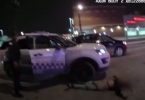Nearly every candidate agrees education and economics are two root causes behind violence in Chicago, but there is a wide variety of opinions on how best to solve the crisis.
Former educator Troy LaRaviere says employment, economic investment and education are all part of the solution, but he says there’s a deeper systemic problem, that the south and west sides of the city aren’t simply being neglected.
“This is a predominantly black school, in a neighborhood that is about half black, and yet you don’t see that kind of violence here because everybody has a job,” LaRaviere said. “Neglect is benign. Neglect sort of implies inattention. This is more than inattention: this is active oppression, economic exploitation and intentional systemic disinvestment.”
Former police board president Lori Lightfoot says the violence epidemic needs a fresh approach and the next mayor must require corporations to invest in neighborhoods.
“This is a public health crisis of epic proportions and we need to treat it as such,” Lightfoot said. “A lot of times I hear, ‘if we go into these neighborhoods, we’re going to be taking a risk.’ It’s not a risk. If you want to do business in the city of Chicago, you need to invest in the city of Chicago.”
Former Chicago police superintendent Garry McCarthy says crime will decline if investment in poor and high crime areas increases. He proposed reversing one of mayor Rahm Emanuel’s controversial decisions: closing mental health clinics in high-crime neighborhoods.
“Reopening mental health centers and bringing social services back to those communities that need them the most,” McCarthy said.
Former Chicago Public Schools CEO Paul Vallas says a more robust police force could help get criminals off of the streets, and he has a plan to hire 500 retired CPD detectives to start solving and punishing the murders and shootings.
“New York and L.A., who have seen a dramatic and consistent decline in crime, have clearance rates in the 60s and 70 percents, we have clearance rates in the teens; think about that: we have clearance on shootings of four percent,” Vallas said.
Businessman Willie Wilson says Chicago can’t police its way out of the problem. He wants to redirect public resources from mega projects like O’Hare to the smaller-scale neighborhood development.
“I do not believe it’s about bringing in more police officers. They done that all his administration – bringing in more police officers, and you get crime going up and up and up,” Wilson said. “$8 billion out at O’Hare? Look, take some of those dollars and put them into the community to create the jobs, the contract, and you’ll see that violence go down.”
Cook County Circuit Court Clerk Dorothy Brown says she’d push for an overhaul of the criminal justice system.
“I’ve worked with the court system, looking at criminal and social justice reform is what my platform is going to be dealing with. Dealing with these twin problems we have of criminal misconduct and of course police misconduct.”
Activist Ja’Mal Green says the city should spend money on social programs
“This is not a police issue – let me put that on the record. This is not a police issue,” Green said. “It starts at home. It starts at home, but when that kid comes out of the home, then we’re failing them when we give them bad environments and a lack of jobs and mental health.”
Tech entrepreneur Neal Sales Griffin says the City should invest more in proven programs like the Violence Interrupters and Ceasefire to prevent violence on the front end, and he says witnesses must be willing to work with cops.
“Getting the trust in the community to prevent crime from happening in the first place, so if you have people in the community that can’t work with the police that don’t trust they have leadership that’s reliable, they’re not going to be reporting on crime and preventing it in the first place.”
Declared candidate Jon Kozlar could not be reached for comment.
Mayor Rahm Emanuel is asking voters to give him a third term when they cast their ballots in February of next year.







